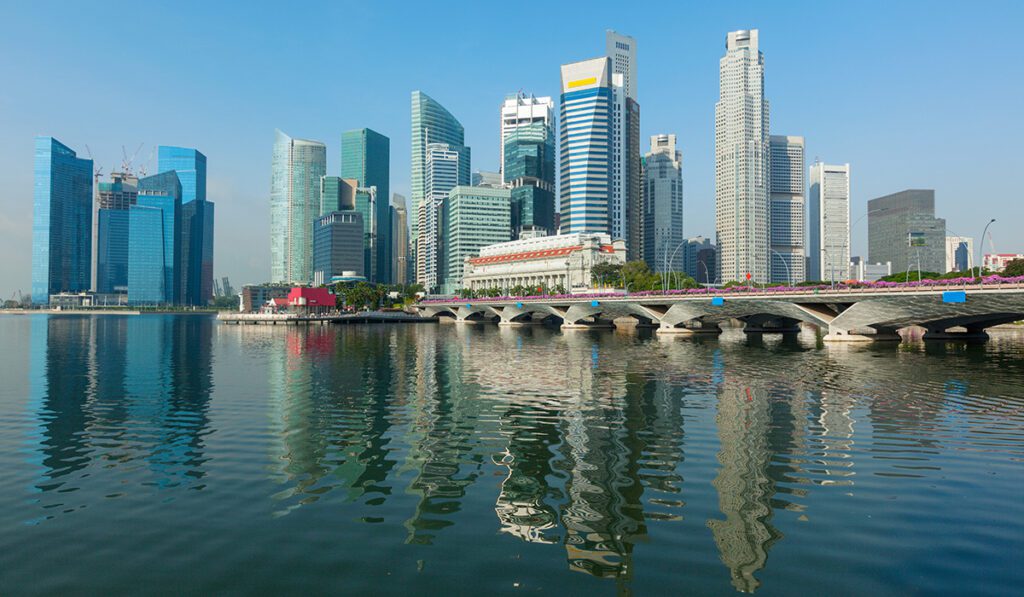

Free Trade Zones (FTZs) in Singapore are pivotal hubs for entrepot trade and transshipment activities, offering unique advantages for businesses involved in importing and distributing goods. In this article, we’ll explore the key aspects of FTZs, the regulatory framework, and the step-by-step process to establish your company in this dynamic environment.
Free Trade Zone in Singapore
A Free Trade Zone (FTZ) in Singapore plays an important role in facilitating entrepot trade and transshipment activities. Free-trade zones allow items to be imported, handled, manufactured, or redesigned, and then exported again without the need for customs authorities to get involved.
All goods imported by sea or air are required to be deposited in an FTZ. In cases where depositing goods in the FTZ is impractical or not allowed, customs-approved premises, such as licensed or zero-GST warehouses, can be utilized.
Goods stored within the FTZ enjoy a suspension of duty and Goods and Services Tax (GST). Payment for these charges is triggered either by the consumption of goods within the FTZ or when the goods exit the FTZ for local sales or consumption in the customs territory.

Explaining the Free Trade Zones Act (1966)
This Act forms the legal basis for establishing free trade zones in Singapore. It includes key provisions such as declaring free trade zones, appointing authorities to administer them, and establishing the Free Trade Zone Advisory Committee.
The Act defines crucial terms such as customs duty, customs territory, and dutiable goods. Declarations of free trade zones are made by the Minister through notifications in the Gazette, with the authority to administer each zone appointed accordingly. The Free Trade Zone Advisory Committee is appointed to advise the Minister on matters related to free trade zones.
9 Free Trade Zones in Singapore
In Singapore free trade zones, nine distinct areas entice businesses with unique offerings:
- Airport Logistics Park of Singapore
- Keppel Distripark
- Jurong Port
- Brani Terminal
- Sembawang Wharves
- Keppel Distripark Linkbridge
- Tanjong Pagar Terminal and Keppel Terminal
- Changi Airport Cargo Terminal Complex
- Pasir Panjang Terminal
Of these, Jurong Port distinguishes itself as a significant multifunctional marine port that manages bulk, general, and containerized goods. Meanwhile, the Changi Airport Group provides unique opportunities for constructing regional redistribution centers with advantages over other airports.
Advantages of Free Trade Zone in Singapore
Imported Goods into FTZs: No Customs Duties
Specific goods, such as tobacco products, liquors, petroleum products, biodiesel blends, and motor vehicles, attract customs duties on imports into Singapore. Nevertheless, companies located inside FTZs benefit from exemptions on customs duties for these imports.
No Goods and Services Tax on Imports
Companies operating within an FTZ are exempt from Goods and Services Tax (GST).
Goods incur import duty and GST charges either when utilized within the FTZ or upon their entry into customs territory for local distribution or consumption.
Exemptions from the Import Permit
Unlike other Singapore companies, companies located inside the FTZ are exempt from obtaining an import permit, reducing administrative burdens significantly.
What are the Singapore Free Trade Zones Regulations?
The Singapore Free Trade Zones Regulations outline security and operational requirements within FTZs. These include the erection and maintenance of perimeter fences, suitable gates, and illumination during specified hours. The regulations also address the establishment of offices or examination stations within the zones and prohibit the transfer of dutiable goods between FTZs without proper written permission.
Other regulations cover building permissions, maintenance of records for permitted operations, and compliance with directions given by the FTZ authority for entering or leaving the zone.
Establishing a Singapore Company located in the FTZ: Necessary Prerequisites
Embarking on the journey to establish your Singapore business and locate it in a free trade zone comes with a set of straightforward yet crucial requirements. Here’s what you need:
1. Set Up a Private Limited Company
A company located inside the FTZ has the same requirements as a private limited company located elsewhere in Singapore. Read about the requirements and documents needed to set up your company here.
2. Financial Considerations Based on the Company’s Income
Tailor your financial plan to your company’s income. This flexibility ensures that your financial structure aligns seamlessly with the scale and scope of your operations within the free trade zone.
3. Company Name Registration with the Trademark Registry
Protect your brand identity by officially registering your company name with the Trademark Registry, solidifying your market presence, if required.
4. Paid-up Share Capital for FTZ Warehouse
If you choose to utilize an FTZ warehouse, commit to a share capital of at least S$100,000. This financial commitment reflects the scale of your operations and ensures the resources needed to navigate the challenges and opportunities within the FTZ.
5. Initial Capital for Co-Working Space
For those opting for a more flexible co-working space, allocate an initial capital investment of S$50,000. This caters to businesses with diverse spatial and operational needs, providing a cost-effective entry into Singapore’s dynamic free trade zones.
6. Utilization of Paid-Up Share Capital for Operating Costs
During your business’s initial year, leverage the flexibility of using the paid-up share capital for operational costs. This acknowledges the diverse financial needs and challenges faced by businesses in their early stages, fostering a supportive environment for sustainable growth.

How can we help
At Premia TNC, we understand the intricate process of setting up a company and locating it in a Free Trade Zone in Singapore. Our experienced and accredited business consultants are here to guide you through the incorporation process, ensuring compliance with all regulatory requirements. From obtaining necessary permits to fulfilling financial prerequisites, our team is dedicated to seeing your business thrive in the dynamic landscape of Singapore’s Free Trade Zones.
Contact us today for a FREE consultation and propel your business to new heights in Singapore’s dynamic business environment.
Frequently Asked Questions
1. What is the purpose of a Free Trade Zone in Singapore?
FTZs facilitate entrepot trade and transshipment activities by allowing the duty-free and GST-free storage of goods.
2. How can a company benefit from operating within an FTZ?
Companies in FTZs enjoy advantages such as exemption from customs duties and GST on imports, as well as relief from the import permit requirement.
3. What are the key regulations governing FTZs in Singapore?
The Free Trade Zones Act and Free Trade Zones Regulations outline the establishment, administration, and operational requirements of FTZs.
4. What are the requirements for setting up a Singapore company in the FTZ?
Besides all the requirements to set up a private limited company, which can be found here, sufficient paid-up share capital depending on the intended use of the FTZ space is also required.





















